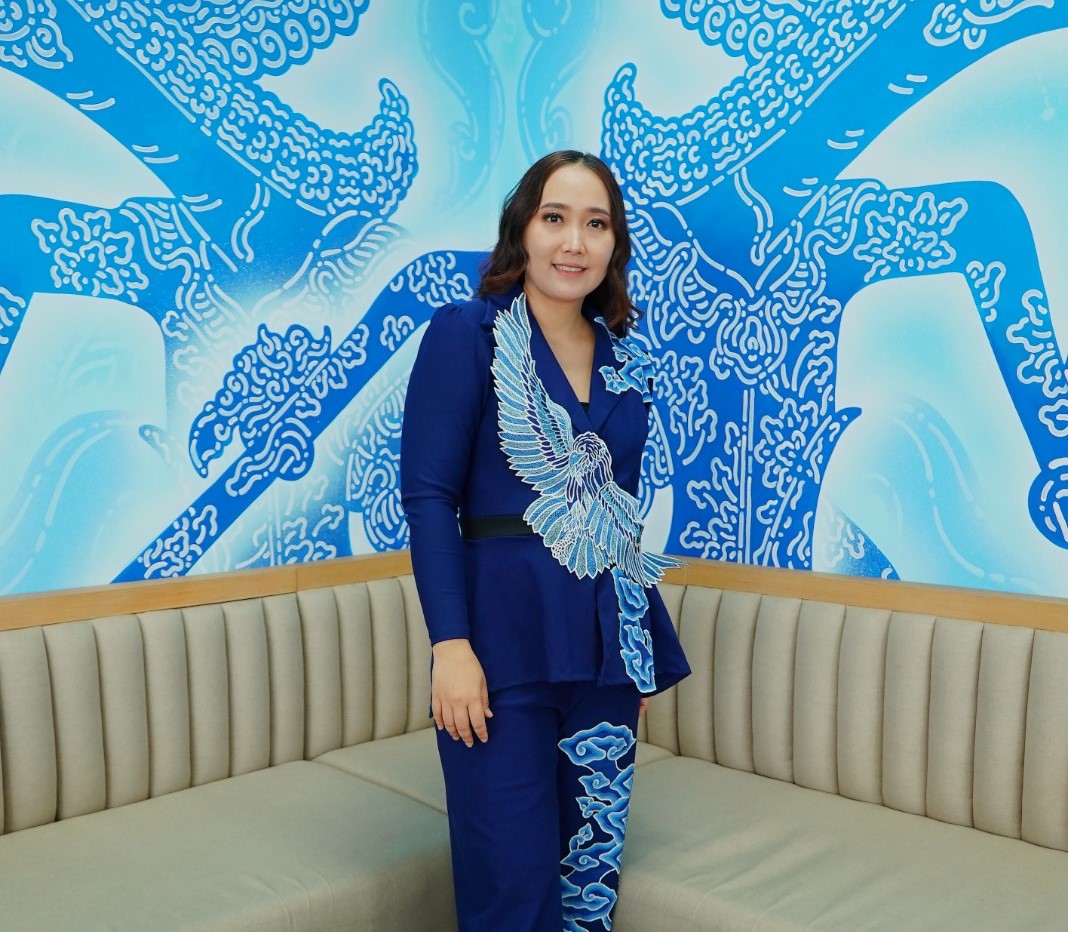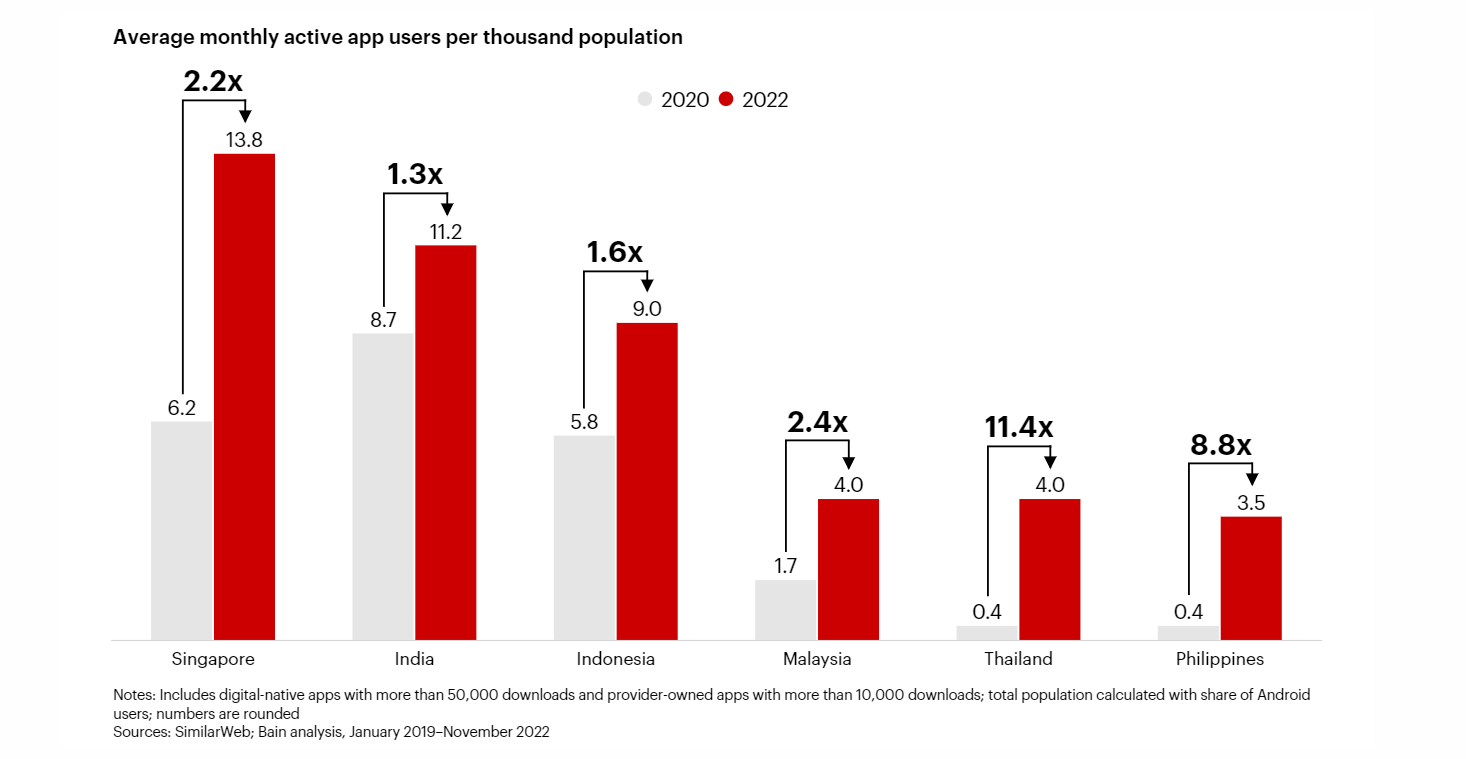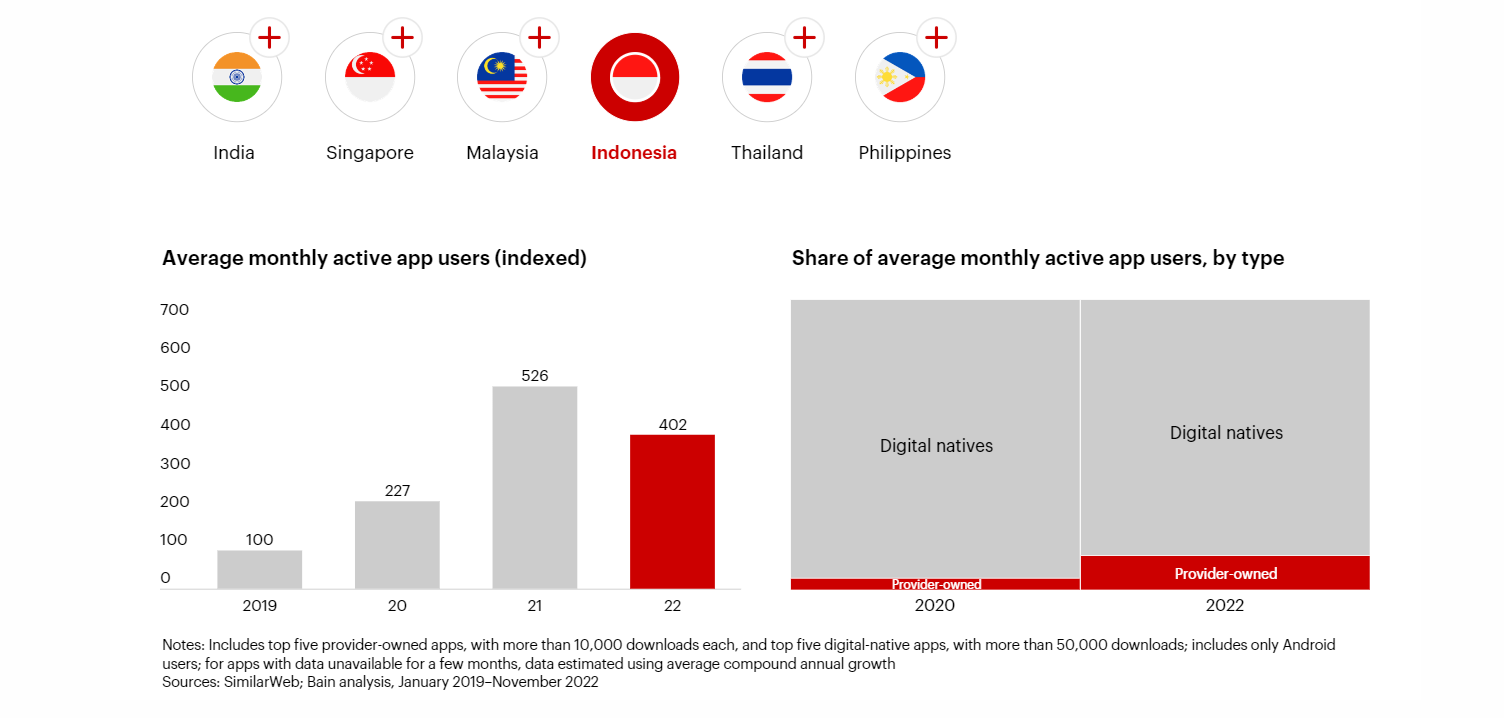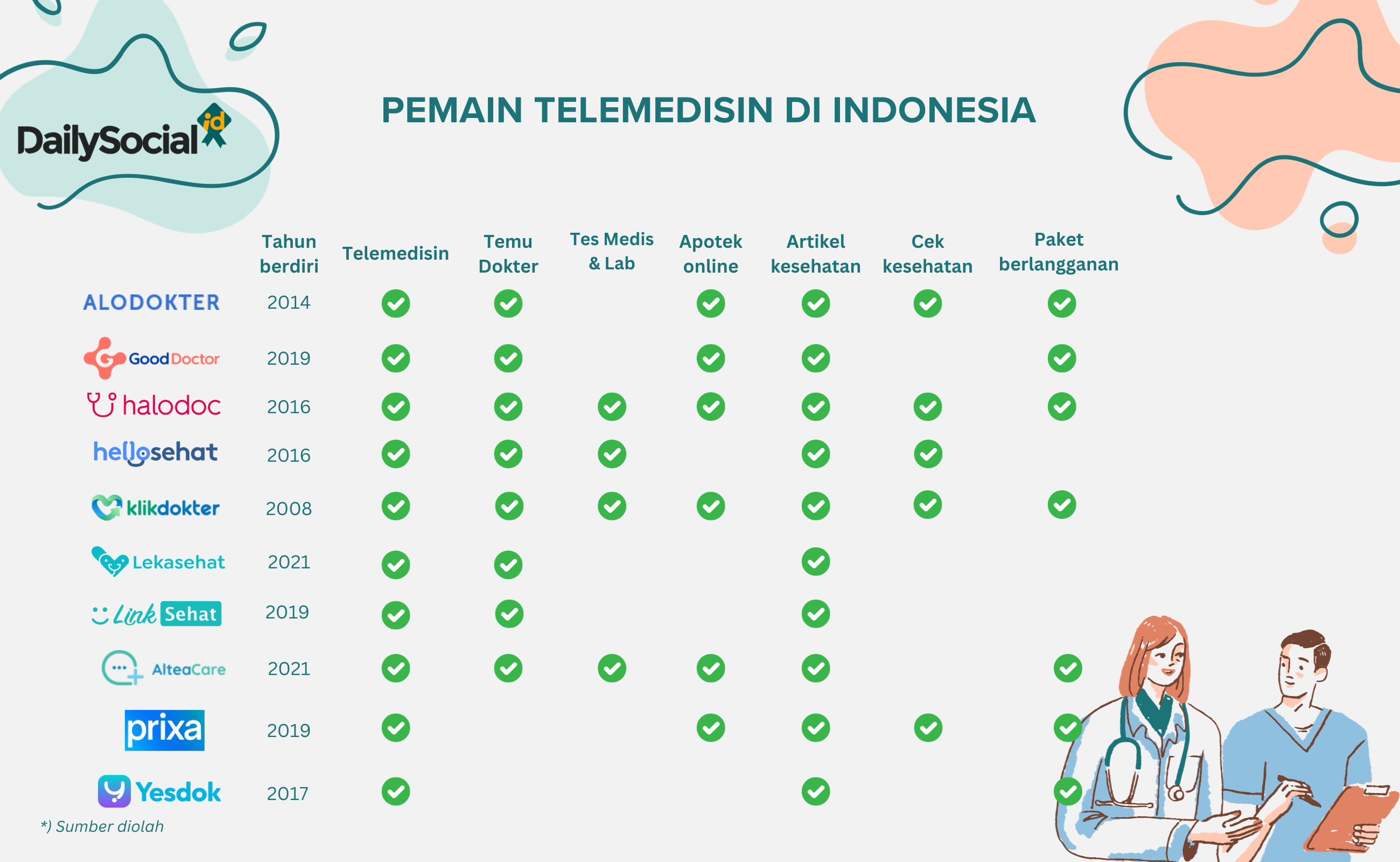Pandemic Subsides, Telemedicine becomes More Meaningful
The leaders of Alodokter and Good Doctor explained the development of post-pandemic telemedicine
The Covid-19 pandemic has changed the dynamics of the medical industry and the healthcare landscape has changed with it. At that time, significant tensions occurred in hospitals and health systems. Overcrowding in hospitals is common because health workers lack resources.
The pandemic has created new challenges, but it has also accelerated the acceleration of healthcare innovation. There will still be an imbalance in the number of doctors, but health care providers must find ways to do more with existing resources.
One of the subsectors that was currently needed was telemedicine, allowing patients to consult remotely with doctors without meeting face to face. Analysis Bain & Company The latest confirmed that high telemedicine usage rates in Asia persisted in 2022 and remained well above 2020 usage levels.
The report also predicts that adoption space could grow in several countries. Users in Malaysia, Thailand and the Philippines have recorded rapid growth, but are far behind compared to users in Singapore, India and Indonesia.
“The development [of adoption] is very significant from year to year. "If someone thought that the endemic was decreasing because there was no longer a pandemic, now it is actually increasing because people are getting used to and more comfortable using telemedicine, and also believe in telling their problems to a doctor," said the Co-founder and President Director. HealthReplies.com Suci Arumsari to DailySocial.id.
Compared to when Alodokter was only founded in 2014, some people have only just begun to hear about telemedicine services, but they are still reluctant to use them. This means that telemedicine has the opportunity to grow even bigger in the future.
"So that development has increased by 200% from before the pandemic and Even "Even now the development remains significant," he added.
The increase in adoption was also felt by Good Doctor Managing Director of Good Doctor Technology Indonesia Danu Wicaksana, who said that adoption among individual users, as well as corporate and insurance users continues to increase. The company has collaborated with more than 60 insurance companies and more than 2.500 companies.
According to Danu, there are two hypotheses behind the continued development of telemedicine after the pandemic. First, it is believed that there is a phase of public adoption of telemedicine services which provide solutions and comfort during the pandemic. This causes the adoption of telemedicine not to decrease, but instead to increase.
Second, not only the public sees the benefits of telemedicine, but also the payers (payor), namely insurance companies and their corporate clients.
"Referring to the insurance industry abroad as well, such as in the United States and China, they see that telemedicine is very worthy of being included as one of the provider primary services, especially in first-line services (primary care) to provide better service to its customers, as well as in their efforts to maintain the claim ratio," explained Danu.
Suci said that this increasing adoption indicated an increase in the level of community satisfaction. Their habits are slowly changing, no longer consulting a doctor when they are sick, but taking preventive measures before they fall ill. This learning process was greatly encouraged during the pandemic, this positive trend continues until now.
"We provide learning to them, not just looking for information but talking Yuk to the doctor. If there is a problem that cannot be resolved using telemedicine, they will be directed offline to be handled immediately. This telemedicine helps people understand what initial preventative steps should be taken and what should not be done. […] that telemedicine is not to replace the role of doctors or health services.”
“The community has become more aware and his behavior starts to be smart and responsive, if feel sick always looking second opinion about how they feel. "So the potential for telemedicine in Indonesia will be much greater in the future, especially as it is supported by technology so the ecosystem will be fully developed from AZ," continued Suci.

The habit of encouraging people to ask doctors is also "forced" for Aloprotection, a health insurance product targeting individual and corporate users. The benefit offered is protection of IDR 100 million per year cashless outpatient, inpatient & medication costs. This product has been available since 2022 thanks to collaboration with Sequis Life and Cermati Protect.
Even though it is 'forced', thanks to the complete Alodokter ecosystem (telemedicine, make an appointment, Aloshop), users can use telemedicine without limits, consult with many doctors even if they are not sick. The medicine will be sent immediately after you have consulted a doctor without being charged any more. If it really can't be treated, the doctor will give a referral letter.
“We want to change behavior. Aloprotection is not only a product that provides benefits but also provides education and information. If you are sick, don't just take medicine, don't take action yourself, it's better to tell a doctor. This is what differentiates us from insurance. At first it was a hassle [having to consult first], but this is very economical. Whether you're sick or not, you can still consult a doctor continuously, so there's nothing to lose."
Currently, Alodokter's monthly active users have reached 30 million people, supported by 1.000 general practitioners and 500 specialist doctors, as well as 1.500 hospitals and clinics spread throughout Indonesia.
Maintain relevance
Both Alodokter and Good Doctor believe that technological support can bring the adoption of telemedicine even more rapidly. Suci said that technology and medicine are two important aspects that the company prioritizes. Some that have been launched are: electronic medical record (Electronic Medical Record/EMR), Alni --virtual assistant conversational interaction with AI-powered doctors, cough test (remote diagnostics) in collaboration with ResApp.
It is claimed that these three innovations make the telemedicine process quicker to handle. Alni for example, developed as clinical decision tool who is able to interact with patients regarding health conditions, for initial consultation steps and assisting doctors' workflow in treating patients. Alni has also been connected to EMR.
"Alni does not replace the doctor but as an assistant, the doctor still decides the final diagnosis. "Alni is significant for doctors because it is more efficient and speeds up time."
Meanwhile, the ResApp cough test is also powered by AI and can detect cough sounds via the user's smartphone. This feature will help doctors carry out examinations remotely by matching the characteristics of cough sounds based on six diagnoses: lung infection, asthma, chronic obstructive pulmonary disease (COPD), ARI, whooping cough, and bronchitis. This test has an efficiency level of 95%-97%.
“This cough test can only be used by patients who have a recommendation from their doctor. "This method is also used by doctors when taking conventional procedures in hospitals, but it is more efficient because it is done from the user's smartphone."
For Suci, company innovation and transparency towards the public plays an important role for every business that plays in the online realm so that it can continue to grow. We always open lines of communication with the entire ecosystem (patients, doctors, industry players) to get feedback.
“Research is important so that we have relevant products. If you create a business you can't do what I/we think you can. But look at whether the market needs it or not. "Apart from that, research [must be continuous] both before and after the product is launched."
Not much different, Good Doctor focuses its innovation based on its main consumers, namely corporate. Some of them:
- plug-in feature: application integration into various applications from insurance companies or marketplace applications in general in Indonesia,
- co-payment: insurance partners can implement a co-payment policy for certain benefits, for example 80% covered by insurance and 20% covered by employees,
- electronic sick note: company employees can get an official electronic sick note from a doctor at Good Doctor when they are sick and must report it to the company's HR directorate.
- Population Health Management (PHM): disease prevention solutions for corporate employees through medical check-up.
“As our insurance company and corporate clients continue to grow, we are developing several features to suit their needs. "Innovation never stops here, and we will continue to develop it in the future," said Danu.
To maintain user satisfaction, Good Doctor routinely conducts regular quarterly customer and partner surveys (doctors, pharmacies, hospitals, etc.), known as NPS surveys (Net Promoter Score). This is needed to get constructive suggestions from customers and partners so that Good Doctor can continue to understand and comprehend what they need from time to time.
"Secondly, we always try to personalize services so that consumers get services that are more personal and according to their individual needs. "Thirdly, we also carry out regular comparative studies, looking at trends in digital health services that are developing throughout the world and we are trying to adopt them to the Indonesian market, in accordance with applicable laws and regulations."
Prospects for telemedicine
Danu said that with the strategy of attracting B2B users, he was able to support the contribution of the telemedicine business to the overall business. It is claimed that quantitatively, the percentage reaches 60% -70%. Revenue obtained from purchasing and shipping medicines, as well as collaboration with various FMCG and pharmaceutical companies.
"In absolute terms, we see good development every year, where several business lines in telemedicine are able to grow approximately double from 2022 to 2023."
Alodokter also recorded positive business from each of its products. The biggest income comes from the telemedicine business at 30%-40% every month, followed by business from making doctor's appointments. This good performance has enabled the company to make a profit this year, although Suci was not prepared to provide further details on the amount.
"We have made official profits starting this year, next year we want to make even bigger profits. "Alodokter's businesses are very interconnected because they are in the form of an ecosystem, so our monetization is in synergy with each other."
For Suci, the opportunity to expand adoption is still very large because access to health is also needed by people in second- and third-tier cities and even remote areas. Therefore, support for good internet network distribution is very much needed. On the one hand, now telemedicine services are not only used when sick. One of the consultations that many users use is mental health and healthy living.
More Coverage:
"I believe this is a very promising business, as long as it is supported by technology that makes things easier so that it can bring the benefits of digitalization to society. "Because if telemedicine is not accompanied by technology, for example chatting with a doctor but the reply takes a long time, it will not be effective."
Regulatory support is also provided from the government. Danu conveyed that as a follow-up to the Health Law Number 17 of 2023 which has been promulgated, it is hoped that the Ministry of Health can take the lead in promulgating the regulations so that the adoption of technology in the health sector becomes easier, especially telemedicine services which have been proven to be able to help provide good health services during the pandemic and in This is post-pandemic.
"We participate directly in the Regulatory Sandbox initiated by the Digital Transformation Office (DTO) of the Ministry of Health to ensure patient safety and privacy. "Good Doctor has entered the stage as a partner supervised by the Ministry of Health and is currently entering the final stage of becoming a partner supervised by the Ministry of Health."
Investor enthusiasm
AC Ventures Investment Associate Giovanni Wilson said that in the healthtech sector, AC Ventures focuses on startups providing health support infrastructure that can increase the utilization of health workers and the reach of health services, both care and treatment.
This is in line with the main problem of the health industry in Indonesia, namely the low level of health services as indicated by the ratio of hospital beds, the ratio of health workers, and the ratio of pharmacists to the population.
He continued, technology, such as smartphone applications, can be used to access and open things pintu services for areas that are not yet reached by retail outlets, for example bank branches or clinic and pharmacy branches. By providing services via the internet, health workers and products available in big cities can also be enjoyed by users who are far away, without having to spend the money to visit in person.
“Digital technology can also provide accurate and direct information to all users regarding health products, for example vaccines, medicines and new surgical procedures. "Apart from that, it can also be an educational platform regarding health, lifestyle and the risks of new diseases," said Giovanni.
Apart from the support of digital technology, he continued, the level of participation in health insurance as an element supporting the health industry is also important in facilitating health consumption. For example, the BPJS program has a very positive impact on the basic health needs of workers.
"Indonesia's population, which is projected to continue to increase in income and enter the middle-income country, will provide a positive impetus to health insurance penetration, which will ultimately open up access and mindsets regarding the consumption of health services from treatment to prevention."
So far, ACV does not have a special managed fund for healthtech. The funds invested come from AC Ventures Fifth Investment V (ACV Fund V) worth $250 million, for all early stage startups, including healthtech. The healthtech subsectors that have been included in the ACV portfolio are wellness (Sirka) and digital clinics (KLAR).
Sign up for our
newsletter
 Premium
Premium




